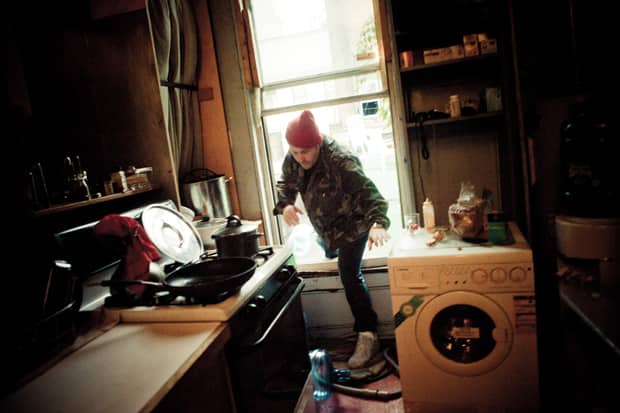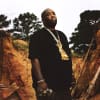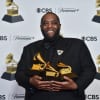The producer is one of the most crucial yet anonymous figures in all of music. Every other week, with Beat Construction, an extension of our column in the magazine, we aim to illuminate the role producers are playing in creating some of our favorite music. This week we talk to El-P, a producer whose resume runs deep. In the '90s he redefined New York's rap underground as a member of the pioneering crew Company Flow and then did it again in launching the seminal (and since-retired) Definitive Jux imprint at the turn of the century. El's discography is about to swell considerably in the coming weeks, with R.A.P. Music, a full length collaboration with Killer Mike, set to drop tomorrow and his own long awaited third solo album, Cancer4Cure, hitting shelves the following Tuesday.
How did you get into making beats? I discovered it early because I wanted to rap. I probably started trying to make beats at around 12. I had a boom box with a dual cassette deck and a mic so I used to make pause tapes. I think a lot of people started like that because it was all I had. I would just take rap records that I liked and just loop the beat by pressing pause and record and make like five minutes of these beats. I got really good at it and people would have me do little blends and mix tapes for them. And because it had a dual cassette deck you could then take that and record it into the other one and use the external mic over it. So I did all of my first demos, just me having fun, on this bootleg dual cassette boom box. Then at around 13 I borrowed a Casio SK-1 from this kid that I knew, which is like this little toy sampler basically that had maybe two seconds of sample time on it. He didn't even care about it, he didn't know what to do with it but to me it was like gold. It was such a short sample time and there was no sequencer. It was marketed for you to be like "Hello" and then just [play it back] on one of the keys. But if you sped the record up to 45, sampled it and then played it on the lowest note on the keyboard then you could get a longer piece of a break. Eventually I scraped up some money and bought a used four track. Then a little bit later, around 14 I bought a TR-505 drum machine, which was the first real piece of equipment I ever bought in my life.
What do you think drove you to push hip-hop to more experimental ends in those early days? That wasn't how I looked at it. I was just trying to make dope shit inspired by the shit that I liked. I always thought I was just trying to make the next EPMD record or the new BDP record or the Ultramag record. I was learning how to do shit, trying to figure out how to make shit that makes me feel like all these great records that inspired me. [Company Flow's] "The Fire In Which You Burn" sounded insane to people at the time, but really what that was was me taking "Top Billin'" and just extending the snare. I was trying to do a different take on that. I think it was just engrained in me to try and come up with something that was new and that came from me being in New York in the '80s and seeing graffiti, knowing graffiti writers and just feeling like it was about style. You had to put your imprint on the culture. The thought was never really to try and do anything weird or experimental, I just wanted to see what I could do.
At this point in my life, everything is experimental. I believe that experimenting is what production is. But it doesn't mean much if you don't have a solid foundation in what you're experimenting with. You can't really deviate from music unless you know music, it's not gonna work. There are certain things you need to make people feel [a hip-hop record] no matter what you're doing. You need to feel those drums, you need to feel the bass, there needs to be something that roots [the music] in the feeling of hip-hop you love. Then if you're tasteful about it you can start playing with structure and sound creation and start trying to come up with something that's yours.
Now how did your Company Flow sound evolve into the more aggressive style you have today? My tastes and my approaches are always changing and growing. I grew up on listening to like Mantronix and BDP and EPMD and Kool G Rap and Ultramag and Public Enemy and Fat Boys and Run DMC and a lot of those early records, those Rubin-era records, those were always snare and stab heavy records. The Beastie Boys first album, the LL Cool J shit, Slick Rick, it was all stabs, sparse drums, just real hard hitting shit. I think that always carried itself through what I do. There's also other things that I ended up doing because I got technically better at things I couldn't do earlier. Like melody [laughs], song structure, things like that.
In some ways you can also map everything by the technology that I got over the years. I graduated from pause tapes to a four track to a drum machine to a real sampler. In the early '90s I got my first real sampler, an Ensoniq EP 16+ and that was when it opened up for me in a lot of ways. That's what the Company Flow record was made on. After that it went further. I started getting synths and Pro Tools, being able to layer more. Now I'm just at the point where I'm still searching. I'm still trying to figure out what the fuck to do. Every time I sit down I kinda forget how to make music. Every time I look at my little work station I'm like "Alright… I got a joint, I got a cup of coffee… what the fuck do I do?" So it's new to me every time and every time I try to get excited about it again. No matter what the thing that never changes is that I'm always trying to make myself feel like the records that are inspiring to me at the time.
What type of gear are you using now? Are you mostly inside of the computer at this point or are you using external stuff still? I use a shit ton of external stuff. Pro Tools is the hub, for sure. I have a Pro Tools HD system. I was using Pro Tools LE for a long time but then I started getting offered these remixes for rock bands and shit. I remember I bought Pro Tools HD because I got a Mars Volta [song to] remix and that shit had like 96 tracks on it. I couldn't even open it! But yeah Pro Tools is the hub and I use a lot of external synths. I've had Moogs and Oberhiems and Tritons and a Jupiter 4, a lot of different stuff. It's a rotating cast. You get a synth, you use it, eventually you sell it and get a new one. It's a lot of external stuff and a lot of internal stuff. I have no problem using plugins and [virtual] synths, that's just another resource. If you know how to make something sound good or gritty or different then it comes out of the box and you're in a good place. I still use my EP 16+. [Another] thing that's evolved for me a lot over the years has been noise manipulation. I use a lot of outboard gear—pedals and filters and oscillators—to take a sample, change it and bring it back into the computer.
It seems like outboard gear in general is becoming a rarity in hip-hop. It is, but for me that's great because it makes me feel like I've got a secret weapon. The fact of the matter is though that most kids coming up this days can't afford outboard gear, so they're getting Logic or Ableton or Fruity Loops or Acid, which is great because years ago none of that shit was available to me. Now kids can start being creative right away, which is dope. But the downside to that is you start to listen to records and you feel like you know the record already because it's the same sounds that everyone else is using. You can tell almost, Oh, this record was made in Logic. So I try to confuse people. I'm a producer nerd so I don't want people to listen to my records and feel like they can identify where the sounds are coming from. I want them to feel like it's something that they don't understand or that they can't pigeonhole. I want people to not know how I do what I do. I think it's a pride thing.
Let's talk about this Killer Mike project, that's the first entire full length you've done for another artist since Cannibal Ox's The Cold Vein, right? That's a good question. Is it? Yeah, actually you're right! Obviously I've done a lot of work on other people's records but this is the first since Cannibal Ox that I've done [another artist's] album 100 percent front to back.
What was it like getting into that mindset again? With Mike it was really easy and amazing. It was the most fun I've had collaborating with an artist in my life. We just had a chemistry. I knew what I wanted to bring for Mike and it wasn't what I wanted to bring for myself. I was making my album at the same time and I knew that there had to be a clearcut difference between my record and his record. I think that's what being a producer is, I don't think being a producer is making your record for someone else. So once I had the idea and knew what I wanted with Mike, which was to really harken back to something classic without making it sound old or referential, it flowed pretty easily. It was a great feeling. The best situation you can be in as a producer is when you're working with someone who just says "I trust you." "Do your thing."
It's trial and error a little bit, there were things that Mike didn't feel that ended up changing, for sure. But for the most part [this] is exaclty the type of collaboration I've enjoyed in the past. It got me into a really great headspace. For me doing a beat for people here and there on their records is cool but it's not the ultimate feeling artistically. The ultimate shit is really crafting something as a whole and I love making full albums. I like being able to relate track one to track ten. It's an art form that I'm into.
Mike obviously comes from a very different production background. Did you feel a need to go back and study the Southern rap production touchstones before getting in the studio with him? Actually our influences are really similar. One of the reasons why we liked each other and did the record that we did is because we're the same age and we grew up on all the same record. Now there are records that were more popular in his region than my region throughout the years but we grew up on all the hip hop classics in the same way. When we were talking about records that were inspiring us it was the same records. We were trying to capture the magic of records like Amerikkka's Most Wanted, the idea that when Ice Cube left NWA and went to do his record he got the Bomb Squad. At the time everybody was like what the fuck? That's crazy. I thought it was amazing. Because of the combination of those styles they came up with something really different special. We both felt that hip hop music now can get kind of homogenized and a little bit scene-referential, so we just wanted to take everything that we love and use it as inspiration. Not even necessarily reference it, just use it as inspiration.
Working with someone like Mike, I have to be respectful of Mike's culture in music and where he's from because it forms who he is as an artist, so you had to touch on a little bit of the soul, a little bit of the country, Atlanta aesthetic to some degree. Not mimic it but pay respect to it, because that's who Mike is. That's why songs like "Southern Fried" or "Willie Burke" exist on the record, that's an important part of who he is.
It must be a relief having two major projects dropping over the course of a week. What comes next? I'm either gonna go out and conquer the world or I'm gonna curl up into a ball and suck my thumb. We're gonna go on tour. It's gonna be me, Mike, Mr. Muthafuckin Exquire and Despot on a big North American tour starting in June and just see what happens. There's some cool production opportunities coming my way, but I'm at the point in my life where I'm just having a lot of fun doing music. I don't have any plans. Quite honestly, man, I'm just kind of glad to be here.



